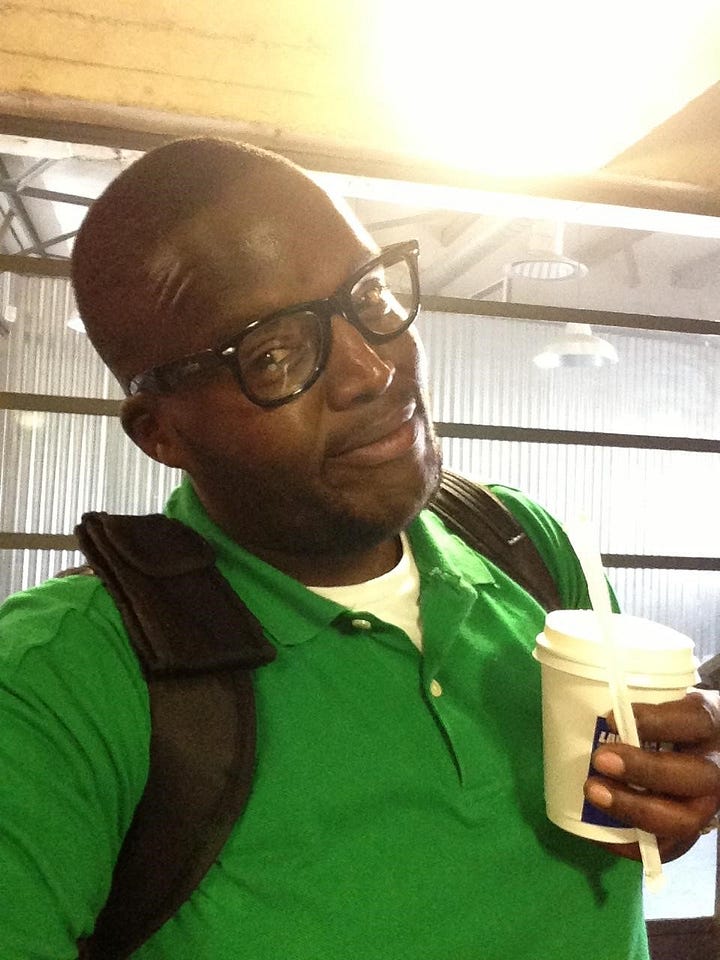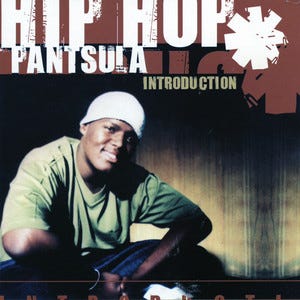Fifteen years ago, I found myself sitting on a closed toilet in a music venue in Braamfontein, Johannesburg, with a vintage typewriter on my lap. It wasn’t easy to keep the object balanced while turning on the seat and “thinking and writing”, as the video director had instructed, but I was up for the task because of the person who had asked me to be there that morning.
Hip Hop Pantsula, or HHP, was shooting the video for his upcoming single, “Mpitse”, an infectious, bass-heavy party song that remains an impeccable showcase of the rapper’s elastic, easy lyrical flow. And I wasn’t the only person in The Alexander Theatre’s toilet stalls that day. Aus Tebza - Tebogo Sedumedi, the bass player in HHP’s band - was also there, along with Ross Jack, the song’s producer, and an assortment of characters bringing to life the track’s lyrics.
At the time of the video shoot, I had written about HHP for about a decade. I had first been introduced to his music when I was at EMI’s Johannesburg offices and the head of the company’s South African label, CCP Record Company, called me into his office to hear a new artist whom he described as “talented and smart”. The songs I was played were destined for the upcoming artist’s debut album, 1999’s Introduction, which, we would come to see, only hinted at HHP’s fulsome musical gifts, keeping them corralled within the musical approach of producer Isaac Mthethwa who had been the first to introduce the 18-year-old to Vusi Leeuw, an A&R representative at EMI/CCP.
Some years after that first encounter, my partner became his music publisher - and Jabulani Tsambo, or Jabba as he was called, soon turned into a close and much loved friend.
“I’ve written about you in a new song,” Jabba had told me some months before the shoot. That song was “Mpitse” and he explained that it included a line that referenced me as a “quality” writer of stories as a way of explaining to his family that it was respectable that he wasn’t settling down yet and was on an artistic path. He wanted me to be in the video at the exact moment he said my name. How could I say no to being part of a video which reflects the fun and joy threaded throughout “Mpitse” and which, like the song, still captivates 15 years later?
It’s no surprise that “Mpitse” sounds as vital now as when it first appeared in 2009: Jabba had a bottomless appetite for lyrical subject matter and musical sounds that I still find remarkable.
If “Mpitse” was a party track, “Darfur” - on the same album, Acceptance Speech Re-Written - revealed a lyricist concerned with the struggles of the people of Sudan, and contained a plea for the politicians of the north to pay attention to the death and starvation in the global south country (“We will not back down/And allow the fuelling of the war/We will fight like before/For the freedom of Darfur”) that is as pressing now as it was then. Corruption, xenophobia and the urgent need for a universal humanity all surface in Jabba’s lyrics, his rhyming and rapping as at home with these subjects as with the hit summer anthem “Bosso” (that spawned the catch-phrase“bosso ke mang” - “who is the boss?”), a throwaway song off Motswafrika, an album HHP described as his “most political, most conscious”,
Musically, HHP similarly mined a deep furrow, always seeking sounds that supported his rapping, most often played by his live band. “Futubolo” is Maskandi, “Turn Away” is Reggae spliced, “Bosso” is rooted in kwaito, “Mmabatho” is anchored in South Africa gospel, and R&B and pop - and even disco - surface like shimmering, sun-filled water droplets on all his records.
HHP famously loved a sample. “What would summer be without Jabba? And what would Jabba be without a sample?” he sings over his accomplished band’s funk take on Imagination’s “Music and Lights” and you can hear the Hal David and Burt Bacharach composed “Walk on By” on “Let Me Be” off YBA 2 NW. And those are just for starters. HHP’s voracious appetite for creative exploration also extended to collaborators - Nas on “Keledimo”, Talib Kweli and Omar on “The Sun” and Raheem DeVaughn on “Home”, along with a long list of homegrown collaborators across multiple albums.
But HHP is mostly identified with Motswako and his creative output is strewn with titles that reference this musical form (the albums Motswafrika and Motswako High School among them). Overtly it tied Jabba to his Setswana roots in South Africa’s North West province where he grew up and he frequently referenced Mafikeng, the city where he was born, in songs (“Mafikeng” off 2001’s Maf-Town, “Thabane/Maftown” off 2005’s YBA 2 NW and “Mmabatho” off Acceptance Speech). But Motswako represented much more than geography or language, he told my Rolling Stone writer colleague, Bongani Madondo, in 2012.
“Motswako (harnessing a variety of elements to create a whole) is basically a technique and not a tribal construct. It is the ability to bring diverse elements to create your unique style, story or delivery. There are MCs who rap in English, in isiZulu and Swahili, for example, that use a Motswako flow that I respect.” He added, “My very name is reflective of my belief deeper in this thing. Hip Hop Pantsula is a convergence of genres, styles and influences. I was influenced by Pantsula culture, hence the kwaito and other ghetto soul grooves in my sound. I was deeply shaped by Hip Hop as an artist. I am a child of both.”
We had put HHP on the cover of that December 2012 issue of Rolling Stone South Africa - and Madondo’s words, and the photographs by Chris Saunders were spread over a full eight pages. I secretly wished I had written the cover story because, while the sometimes surreal, cultural reference-packed, gonzo-style writing finally acknowledged HHP’s creative output as art, I longed to share with readers his ability to be - and, most importantly, see - the humanness in his friends, his bandmates, his fans, and all the ordinary people of the world. It’s this Jabba that South Africa fell in love with when he was one-half of the winning “couple number five” (as he says on Acceptance Speech’s “Outro”) in the 2007 season of Strictly Come Dancing. It’s this Jabba who shouted to me “run for the bus, Diane, run” when we had to change planes on our way to the first-ever MTV Africa Music Awards (MAMAs) in Abuja and it became clear that, in what was a pretty chaotic trip, there wasn’t enough ground transport for everyone who had landed at Lagos’s international terminal to be transported to the domestic airport for our onward flight. And it was this Jabba who, when he was visiting us in our home one Friday night, shared his dream about walking from southern to eastern Africa in an effort to use his music - and his physical body - to highlight what we share as humans, beyond the imposed boundaries of race, ethnicity and geography. He called it The Daraja Walk, after a song on the album Dumela, a rock-heavy collaboration with Nazizi that takes its title from the Swahili word for “bridge”. The motivation for the walk (with DJ Zondi) was multifaceted as he said in this moving interview with OkayAfrica where he highlighted his participation in the BBC series, Who Do You Think You Are? and his horror at the xenophobic violence that erupted in South Africa in 2008 as among the reasons for taking on the challenge.
“When they did the documentary, they traced my history and it turns out that my grandfather is a man from Mozambique. He came to South Africa in 1887 with a group of Shangaan guys. Our family hasn’t been keeping in touch with our true roots, our language. Finding that out left me a bit unrooted because I’m known as this South African musician who raps in one of the minority languages seTswana, really taking it to big heights and I actually don’t even know who I am, I don’t know my family like that and I don’t know my language as well. So my need for finding out what’s going on in Africa became even more real.” Mona Hakimi, OkayAfrica (2013)
“Finding out about the xenophobic attacks in 2008 left me a bit disgusted, especially when I read that people were taking Shangaans from Mozambique, saying they must go back to Mozambique. I was thinking there are Shangaan people in South Africa. They are attacking Ndebele people from Zimbabwe but there are Ndebele people in Mpumalanga, or Tswana people from Botswana but there are Tswana people also in South Africa.” Mona Hakimi, OkayAfrica (2013)
It’s especially poignant to remember that Jabba believed enough in the shared possibilities of humanity to walk the distance from south to east Africa when considering the reason I have had this beautiful human, and gifted artist, on my mind. This Thursday - October 24th - will mark six years since Jabba died of suicide in his Johannesburg home, after years of struggling with his mental health. It left all of us who loved him shocked, bereft and wishing it were not so. And the years that have passed since the news broke have not diminished those feelings.
While writing this, I looked through my archive of cassette tapes that I used to make when doing interviews before the availability of digital recordings. It broke my heart to find two tapes on which I have written HHP, but both of which I have recorded over. At the time, new cassettes were expensive and so my stock was often low which meant when I was running to another interview, I grabbed whatever I could and pressed record. I would have loved to have heard Jabba in conversation with me one more time because he was wonderful to interview and talk to. But it is also true that he and I will always be connected in a song and a video that had me clutching a typewriter on a toilet one fine Saturday morning - and for that, I will forever remain grateful.
I leave you with this dear readers.
Appearing in the “Mpitse” video was not the first time an artist had prevailed on me to be filmed for a project they were creating. The other person was Cassette’s Jon Savage - now a successful podcaster - who cast me in his hilarious film, Stone Cold Jane Austen, again as myself. But that really is a story for another day.
And this.
In March 2011 my partner Jay Savage travelled with Jabba to South by Southwest in Austin, Texas. He was, Jay recalls, as intrigued and curious to see other artist of whatever ilk as he was eager to share his music without drama and diva antics; he performed out of his skin in three shows at 4pm, 9pm and 1am, over three exhausting days, during a super full moon. “An abiding memory is introducing him to the music of Emmylou Harris who performed a quietly astonishing solo set at midday in an impersonal, soulless hall in the main festival complex,” recalls Jay. “The simple, glamourless setting was no match for, or detraction from, Harris’ utter absorption and immersion in the moment. Jabba was overwhelmed. His appreciation and openness to any music of honesty and depth was instinctive and razor sharp. As we raced to the next event or the set up of a show of his own, his delight was total. Jabba knew, loved and was adored by our kids. He was such a complete sweet heart - and when he heard that we had named our youngest after the divine Ms Harris, he said, “Wow, Jay. Damn, those Emmylous have got soul”.








Love this! Everything about it
Awesome piece, thanks Diane.